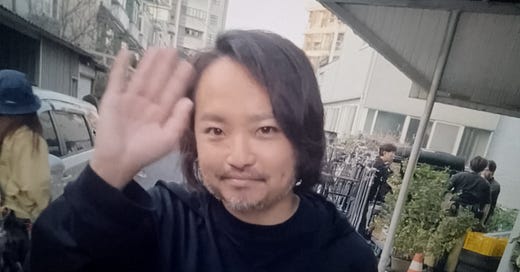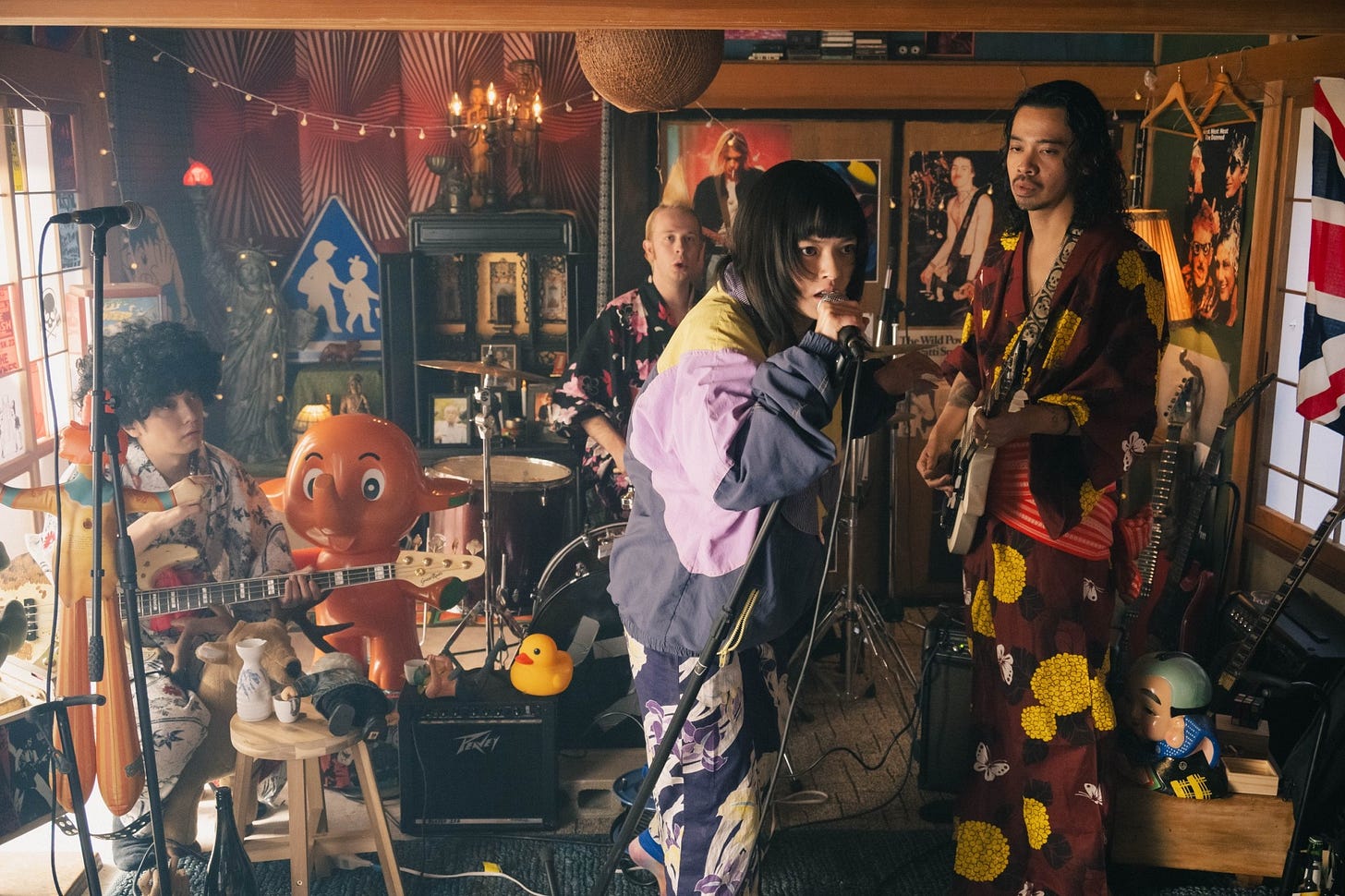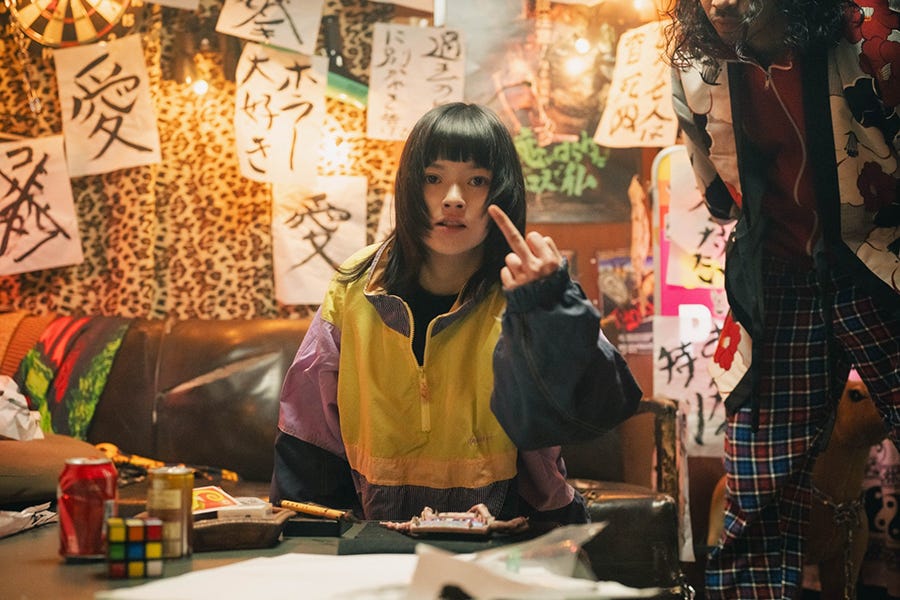Kenichi Ugana talks ‘The Gesuidouz’: "I didn't want to create a three-star film"
The runaway winner of Best Narrative Feature at LIFFF 2024, Kenichi Ugana’s crowd-pleasing punk comedy was followed by a light and sparky Q&A conducted over Zoom (at 3am where the director was!)
Hi Ugana-san, it's lovely to speak with you again. It's been wonderful to screen the film here in London, it's really special.
It's a very warm film in how you treat the characters and their love for one another, and the love that you have for this world and these characters. What strikes me about your films is a strong sense of sincerity. I’d love to hear your thoughts on the warmth and sincerity of your cinema.
Right from the initial stages of producing this film, I wanted to present characters who are lovable but not perfect. They’re closed off, but, because of that, they find understanding with similar people. That was the core of the script.
Tell us about your main quartet. Obviously, you need people who can play music, but you also need people who can adopt the deadpan mannerisms that your films demand.
Starting from the main character— We found Natsuko through audition. She didn't have any prior experience in music, so it must have been a big challenge for her to act in such a role. She performed really well in quite an emotional role.
Are those her vocals?
It is her own vocals that we used. Because it's a punk rock band, I didn't think that the skill in singing was important. But she practiced a lot.
How did you first fall in love with punk music?
In the film, I mention that punk rock is like miso soup. What I mean by that is that punk rock sounds quite violent and excessive, but it's also something comforting. It can be absorbed into you such that it is always beside you. The music in the film was produced by the guitarist from a Japanese punk band called The Mad Capsule Markets, who have played with the Red Hot Chill Peppers in Japan.
The tempo of your humour is quite offbeat, so I'm keen to hear about your process with your actors. Do you have a script that your cast digests all at once, or do you take it step-by-step with them when shooting and go, okay, I need you to do this now, or pull this face, or react to this?
In the script, I don't specify any details regarding performance. On set, I always ask the actors to perform just once, and then we adjust it from there. I asked them to watch the films of Aki Kaurismäki and Roy Andersson before the shoot.
Those influences shine through in the film. Speaking further on that, The Gesuidouz, as a film and also as a band, is unusually transnational. You've got the Union Jack on the wall, Western pop culture references are shared in tatami rooms over bowls of miso soup. Could you tell us about blending East and West and why?
I’ve been listening to British music since I was a kid. I was exposed to Western culture, Western films. I believe that all this culture can easily be transferred across countries, which is why I decided to combine these elements.
Do you feel that this film is primarily a domestic film or an international film? What audience did you have in mind when you were making this film?
I knew from the start that different audiences would find humour in different moments. The way that horror films were titled in Japan in the 1980s was quite unique. For example, The Texas Chainsaw Massacre was titled Akuma no Ikenie (Devil’s Sacrifice), The Evil Dead was titled Shiryô no harawata (Entrails of the Dead). Humour derived from that can only be conveyed to Japanese people.
Rocko telling a story in Japanese is amusing to Japanese audiences. In English, if you look at the translation of the subtitles, there’s humour in the fact that the grandmother is bad-mouthed. In Japan, there are the popular SoftBank commercials where a dog talks, but overseas a talking dog is more unusual to see.
This film is releasing in Japan early next year, but it's already picking up momentum at festivals, more so than your previous films. Did you have a feeling when making The Gesuidouz that you had something special on your hands?
I didn't expect to receive such a nice reception. We shot The Gesuidouz this year actually, in January. We shot it in nine days.
Incredible. I want to ask your feelings on this screening. We're screening in London, it’s the London premiere of the film. It's not Glastonbury, but it's a start, right?
[laughs] As you suggest, screening this film in the UK is something that’s very meaningful to me. I hope the band reaches Glastonbury someday. That would make me even happier.
We've got time for one audience question, and then I'm going to ask a brief wrap-up question.
Audience question: “There were loads of references throughout the film, different horror movies, loads of different anime and things like that. Where did the title of the film come from?”
There’s a Japanese punk band called The Blue Hearts. In one particularly famous track, the lyrics say: “I want to be as beautiful as a rat on the street”. I believe punk music is something that finds beauty within the dirtiness. That idea inspired me to come up with this title. Because ‘Gesuidouz’ in Japanese means ‘toilet water’.
As a final question: The Gesuidouz is a film that feels very inspiring: to go out and make something, to be creative, or to just enjoy making something together with your friends. What are you hoping that this film inspires in your audiences?
Once I complete a film, it belongs to the audience. I would like to leave the judgement up to them. But I didn't want to create a three-star film. I hope it's either five stars or one star.
The Gesuidouz screened in its London Premiere at London International Fantastic Film Festival on 30th November. With thanks to Kenichi Ugana for speaking with us mid-shoot at 3am Taiwan time, and to Kanako Fujita for interpreting.







